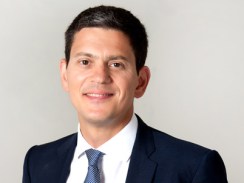David Miliband – 2008 Speech on the Future of the Middle East
Below is the text of the speech made by the then Foreign Secretary, David Miliband, at the United Nations Security Council held in New York on 16th December 2008.
Thank you Mr President. The United Kingdom welcomes this debate and welcomes the prospect of a new UN Security Council resolution, the first since 2004. The violence, intensity and grievances of the Israeli Palestinian conflict have global ramifications and their resolution is the proper business of this Council.
Mr President, the Security Council does not lack consistent policy on the Middle East. Though our resolutions have been sporadic, they have gained significance and status from their scarcity. The numbers 242, 338, 1397 and 1515 ring out as the rallying points for peace. It is right that after a year of intensive activity we take stock, add a new number to the line of previous resolutions and most important resolve to use 2009 with determination to make progress within the framework of this resolution.
The starting point for the United Kingdom is the concerns of the people of Israel and the Occupied Palestinian Territories. They are tired and fearful, tired of conflict, but also of false promises, fearful of each other, but more fearful of the future.
One year after Annapolis, the bilateral discussions have been detailed and serious and the Syrian track has been launched. But cynicism and pessimism have grown. Rockets from Gaza land further in to Israel. The Israeli restrictions in particular on food and medicine causes acute suffering in Gaza.
Mr President, there are plenty of people ready to say that there can be no two state solution. I applaud the determination of Secretary Rice not to join them. The Annapolis process has not delivered a Palestinian state, but the absence of an Annapolis process would have left us much worse off.
Secretary Rice has spoken plainly and powerfully of the stakes, the vision and the necessary steps. Now we have to follow her and help the parties to take these steps.
The resolution before us is significant for its espousal of a comprehensive, just and lasting peace. It emphasises the importance of the Arab Peace Initiative. The United Kingdom welcomes this emphasis.
The responsibility for a resolution of the Middle East conflict does not just fall to Israel and the Palestinians, though they must lead the process. It falls to every state in the region, for the only sustainable peace must be a twenty three state solution, not just a two state solution. Twenty two Arab states and Israel living side by side in security.
We welcome the recent reiteration by the Arab League on behalf of its member states that the Arab world wants formally to end the conflict and establish normal relations with Israel. We believe that the outlines of that peace are clear and can command consensus. Recognition and respect from Arab states for Israel and a Palestinian state based on 1967 borders with a just settlement for refugees and Jerusalem the capital of both states, Israel and Palestine.
Mr President, there will need to be brave decisions on all sides, above all by the bilateral partners in the negotiations. For Israel, this means fulfilling its Road Map commitments, notably on illegal settlements and improving conditions for Palestinians on the West Bank and in Gaza. For Palestinians, this means finding a way to reunite around negotiations and non violence. And those who would torpedo the process must know that we are determined not to allow them to succeed. Hamas must end their rocket attacks on Israeli civilians, abandon violence and demonstrate their commitment to the political process by moving towards the Quartet principles.
Mr President, the United Kingdom welcomes operating paragraph four on the development of Palestinian capacity and the development of the institutions of a Palestinian state. We believe this is vital. The political process and the solution on the ground are, and the situation on the ground, are inseparable. They need to be mutually reinforcing. Better security forces for the Palestinians does not just mean better lives for them, it means more security for Israel. We applaud the efforts of President Abbas and Prime Minister Fayyad to make this a reality and are determined to play our part in supporting them.
Mr President, our role here today is not just to pass a resolution. It is to challenge all those with an interest in the region to join us in 2009. The perils of inertia are clear. Inactivity and confrontation are the recruiting sergeants for extremism from Mogadishu to Manchester. The gains of effective action are the opposite, the reversal of four decades in which the Middle East has been destabilised and the world made less safe. That is why the United Kingdom pledges to do all in its power not just to support this resolution, but to progress its implementation.
Thank you very much.

